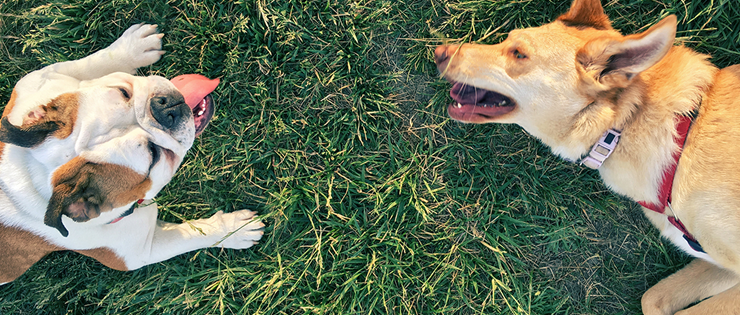
Please always consider the advice of a qualified and experienced professional before working with aggressive/reactive dogs.
If your dog is unsociable towards other dogs, it doesn’t necessarily mean that they hate dogs, it often means something quite different; something that may surprise you! In fact, it really doesn’t make much sense for dogs to hate each other does it?
Dogs are social animals, pack animals if you will. They are instinctively drawn to others of their kind, thriving over tens of thousands of years by cooperating alongside their pack. As humans, and with this knowledge however, it is often disheartening when we learn our dog doesn’t like others of their kind. What do we do?
Firstly, if this is what you and your dog are going through, don’t be disheartened. There are thousands just like you and your best mate who struggle each day to go on a peaceful walk, who become frustrated when their dog won’t listen, or feel completely hopeless when their dog lunges and even makes contact with another dog. When you have an ‘aggressive’ family member, it is understandably stressful, but the good news is that most dogs not only do not ‘hate’ other dogs, but they are often not ‘aggressive’ either.
So how do you find out if you have a dangerous dog, or if the behaviour they are displaying is symptomatic of severe anxiety? Regardless of what your dog’s motivation is, the first and foremost priority is to keep them safe as well as anyone else they may come in contact with. Your dog’s behaviour might be influenced by fear or anxiety, but it can affect the emotional state of other dogs around them, causing them to become negative also. Reactive behaviour can be contagious.
When I put this question to my social media followers, the majority described their unsociable dog as being afraid or reactive, not aggressive. The term ‘aggression’ or ‘hate’, is often overused within the realms of dog training. To me, an aggressive dog is motivated by attaining prey; to kill and to eat. Most dogs on a walk are not motivated by this.
For me as a behaviourist, it is a valuable skill to be able to empathise with your dog. What I mean by this, is think from your dog’s perspective and ask yourself why they feel that their particular behaviour is the best way to deal with a situation. If your dog feels that pulling towards, lunging, growling, or snapping at another dog is the best tool, then the first point of call is to locate a qualified behaviourist to help you both manage the cause and effect of the issue.
- Once you have contacted a veterinary/behaviourist, start to consider some preventative measures
- Create an association of what other dogs mean
- The first step to this is to find out what your dog loves! Is it food? A squeaky toy? A game of tug of war? What ever it is, use it to your advantage
- Next, use this reward to help your dog love the words ‘who’s that?’.
- Say the words ‘who’s that?’ and immediately follow this by the reward you have identified.
- Repeat this anywhere and everywhere in the home and backyard until your dog is conditioned to the term ‘who’s that’ meaning a great reward is imminent.
- Once this is conditioned and under the supervision of a professional, attempt this ‘game’ on a walk with a dog you know (you may need to set this up with a friend or neighbour’s).
- Assuming your dog is motivated by anxiety or even fear, apply this game with the known dog by allowing your dog to see the other at a distance that they are comfortable at (this means they are aware of the other dog, but NOT reacting) and immediately giving them the reward and walking them AWAY from the other dog.
- Repeat this as much as you need to.
- Ensure you always understand where your dog is coming from – meaning you give them distance from the other dog as you reward them, helping them understand that when you are under control, you are always going to keep them safe.
- When you feel confident and under the guidance of a qualified behaviourist, use these skills on your walk.
- Don’t be afraid to perform a U-turn instead of allowing your dog to encounter a stressful situation with another dog. The art to overcoming their anxieties is teaching them that they can consistently trust you to keep them safe. Dogs will often lunge and snap at other dogs if they feel their owner isn’t able to keep them safe.
Remember that you are responsible for an animal who no matter what motivation, is showing behaviours that are antisocial. So, take action; seek a professional and embark on a journey that helps your dog manage their anxieties and fears and teaches you essential practical and emotional skills to help them succeed.
In the meantime, avoid off lead dog parks. These are environments that many reactive dogs really don’t care for!
Good luck.